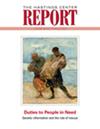老年痴呆症黑人妇女生活中的交叉叙事。
IF 2.3
3区 哲学
Q1 ETHICS
引用次数: 0
摘要
尽管患痴呆症的风险较高,但黑人妇女在关于痴呆症的文化叙述中往往缺席。本文探讨了如何考虑多重和交叉的文化叙事可能会推进痴呆症研究,并使被忽视的群体和社区受益。使用以人为中心的研究方法来了解老年黑人妇女患痴呆症风险的经历,可能会突出导致风险增加的条件,包括经济不稳定、种族主义和照顾责任。充分认识到痴呆症的文化叙事有助于更好地制定社会政策、研究和实践。本文章由计算机程序翻译,如有差异,请以英文原文为准。
Intersecting Narratives in the Lives of Black Women Aging with Dementia
Despite elevated risk profiles for dementia, Black women are often absent in cultural narratives about dementia. This paper explores how considering multiple and intersectional cultural narratives might advance dementia research and benefit overlooked groups and communities. Using person-centered research approaches to understand the experiences of older Black women at risk for dementia may highlight conditions contributing to elevated risk, including economic precarity, racism, and caregiving responsibilities. A full recognition of cultural narratives about dementia informs better social policy, research, and practice.
求助全文
通过发布文献求助,成功后即可免费获取论文全文。
去求助
来源期刊

Hastings Center Report
医学-卫生保健
CiteScore
3.50
自引率
3.00%
发文量
99
审稿时长
6-12 weeks
期刊介绍:
The Hastings Center Report explores ethical, legal, and social issues in medicine, health care, public health, and the life sciences. Six issues per year offer articles, essays, case studies of bioethical problems, columns on law and policy, caregivers’ stories, peer-reviewed scholarly articles, and book reviews. Authors come from an assortment of professions and academic disciplines and express a range of perspectives and political opinions. The Report’s readership includes physicians, nurses, scholars, administrators, social workers, health lawyers, and others.
 求助内容:
求助内容: 应助结果提醒方式:
应助结果提醒方式:


